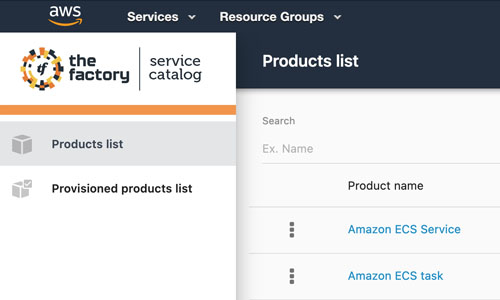
AWS SERVICE CATALOG
Customer wanted to enable its users the freedom to create, manage, and take ownership of infrastructure as part of the Service Catalog in the AWS Cloud. The goal was to remove the manual overhead and setup a fully automated deployment of portfolios and products via CI/CD Pipeline.
AWS Service Catalog
Self-service portal for provisioning pre-approved AWS resources and applications.
Automated Deployments
Fully automated CI/CD pipeline for deploying portfolios and products.
CloudFormation Templates
Infrastructure-as-code using AWS CloudFormation for consistent deployments.
Centralized Management
Centrally managed portfolios and products across multiple AWS accounts.
Deployment History
Complete deployment history and version control for all provisioned resources.
Security & Governance
Centralized security baseline with constraints and approval workflows.
Summary
Our team had limited time to implement the project. We had to strictly follow the schedule and think every step of the way twice prior to implementing. Our client had number of AWS accounts which had to be taken into consideration, making sure that all resources are correctly provisioned, monitored, and secured. Creating, importing, and sharing all products and portfolios with multiple AWS accounts had to take part of the fully automated CI/CD pipeline and version control system that our client had in place.
The Challenge
We gathered all necessary information from the customer. Big chunk of the AWS Service Catalog depends on AWS CloudFormation stacks and our team has started creating all portfolio and product templates from scratch. Being successful with this task, we've started working on the CI/CD and created a stable automated pipeline that allowed the management of the catalog easily.
The Solution
Applying constraints and specific group of users working with the catalog was a priority. We've minimized the time and cost of AWS resources provisioned by the Service Catalog drastically.
We've given the users the ability to manage their own resources and take responsibility. Notifications are being sent for all infrastructure running reminding users about that. Each resource can be monitored individually, thus providing security and separation.
AWS, Azure, GCP
Design, Plan, Build
Everything in code, speed, consistancy, repeatability, ...
Centrally managed cloud infrastructure
Self-service cloud
Centralised security baseline
Read about our Cloud Landing Zone Service
The foundation for a succesful transformation to the Cloud is the use of a Landing Zone. Landing Zones bundle cloud environment configuration such as; Security, Compliancy, IAM / RBAC, Networking, Billing, Logging, Monitoring and Auditing as well as the configuration of products to support specific workload requirements. Landing zones are delivered using Infrastructure as Code (IaC) which ensures consistently trusted, rapid and repeatable deployments.
Read More